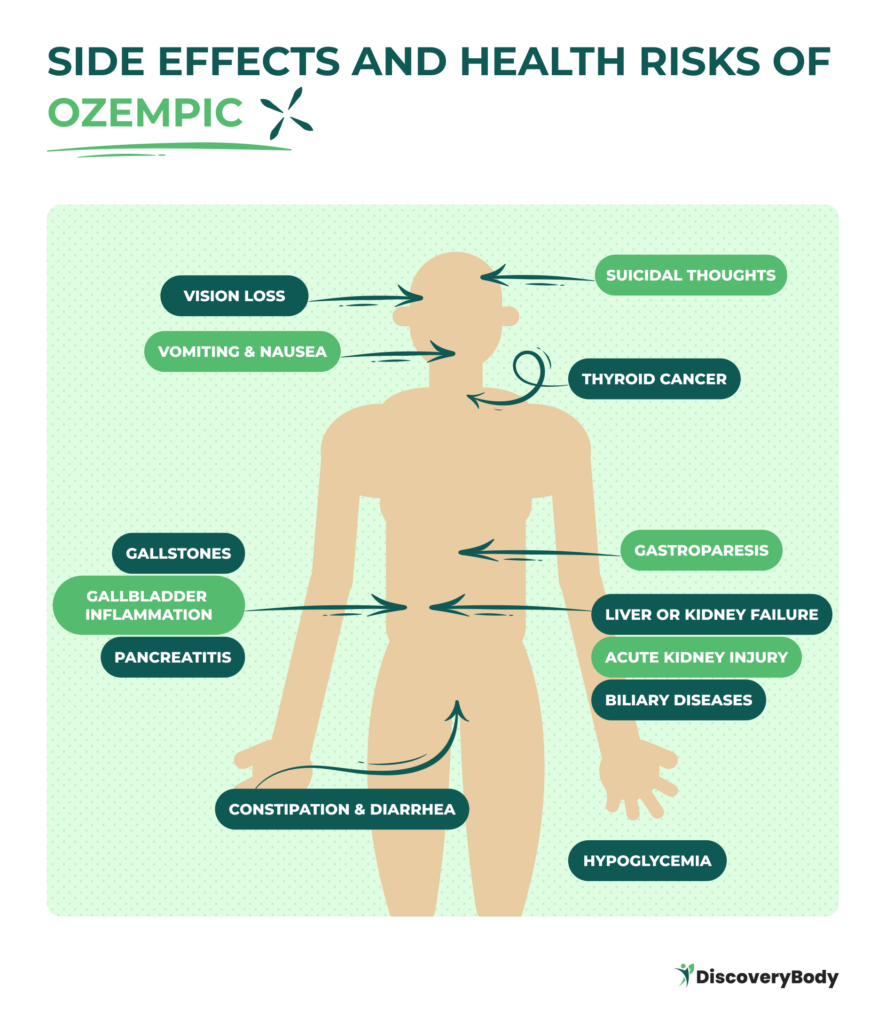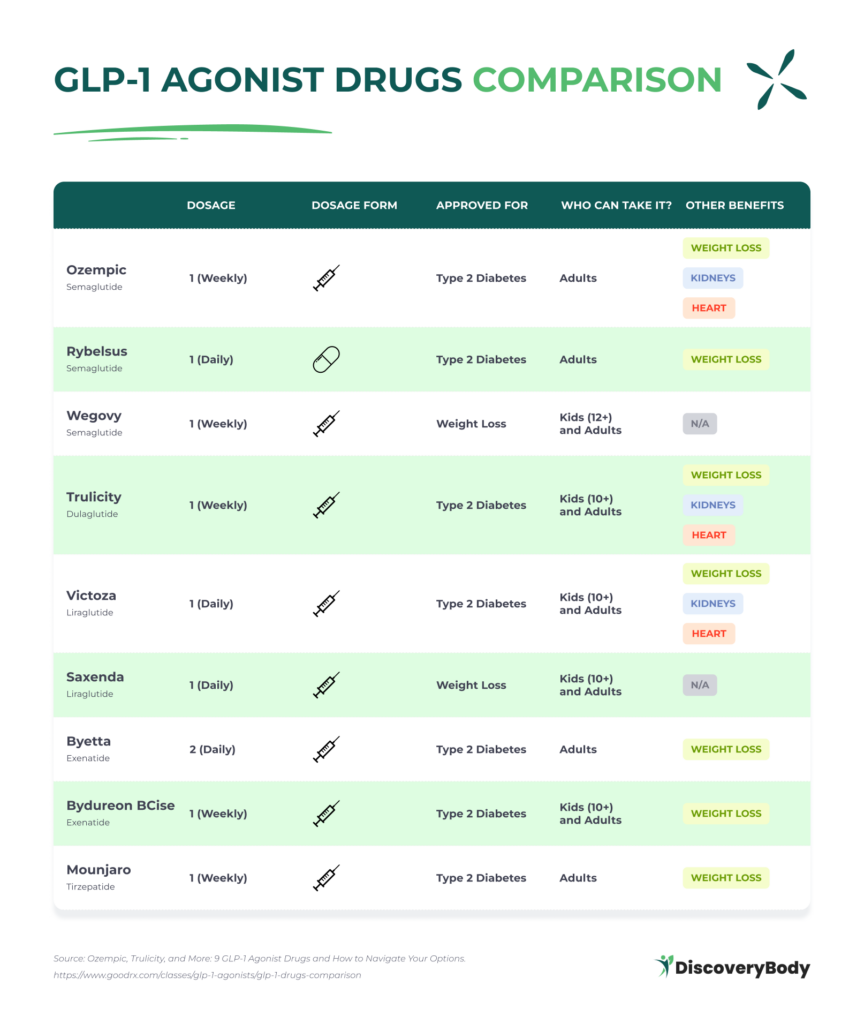No products in the cart.
Medically Accredited
How Does Ozempic Work for Weight Loss? All Your Questions Answered
Ozempic (semaglutide) is a prescription drug primarily used for the treatment of type 2 diabetes. However, it has also gained attention for its potential as a weight loss medication. In this guide, we will explore how Ozempic works, its off-label use for weight loss, dosage, side effects, alternatives, and more.
Ozempic, also known by its generic name semaglutide, is a prescription medication primarily used in the treatment of type 2 diabetes. It belongs to a class of drugs called glucagon-like peptide-1 receptor agonists (GLP-1 RAs), which work by increasing insulin production and slowing down digestion to regulate blood sugar levels.
While Ozempic is not specifically approved by the Food and Drug Administration (FDA) as a weight loss medication, it has shown potential for weight loss in some individuals. In this guide, we will explore the off-label use of Ozempic for weight loss, its effectiveness, dosage, side effects, alternatives, and more.
How Does Ozempic Work for Weight Loss?
Ozempic works by mimicking the action of a hormone called GLP-1 (glucagon-like peptide-1). This is a hormone that helps regulate blood sugar levels. It is naturally produced by the intestines in response to food intake, however people suffering from type 2 diabetes have lower levels of this. By imitating GLP-1, Ozempic helps trigger insulin production to control blood sugar after eating.

On top of that, Ozempic also interacts with that section of the brain that curbs appetite and slows digestion, helping people feel full longer so they eat less hence potentially helping people to lose weight.
Is Ozempic Effective for Weight Loss?
Off-Label Use
While Ozempic is mainly prescribed for the treatment of type 2 diabetes, some healthcare providers may prescribe it off-label for weight loss or weight management. Off-label use refers to the use of a medication for a purpose other than its approved indication.
The potential for weight loss with Ozempic is believed to be due to its effects on appetite and digestion. As mentioned above, by slowing down digestion and increasing feelings of fullness, Ozempic can help individuals eat less and potentially lose weight.
Effectiveness for Weight Loss
Ozempic has been found to be effective in promoting weight loss in certain individuals when combined with a healthy diet and regular exercise.
In studies, a significant number of individuals experienced weight loss as a result of using Ozempic for the treatment of type 2 diabetes or to reduce specific heart-related risks. However, it’s worth mentioning that these studies did not specifically examine Ozempic as a weight-loss medication.
If you’re interested in finding out more about the weight loss studies conducted on Ozempic, you can check out the drugmaker’s website. You can also take a look at Ozempic’s prescribing information or, much better, have a conversation with your healthcare provider.
Despite the results being reported, it is still important to note that weight loss results can vary depending on factors such as diet, exercise, and individual responses to Ozempic. Additionally, not everyone will experience weight loss with Ozempic. Again, it is essential to discuss your weight loss goals and expectations with your healthcare provider before starting Ozempic.
How to take Ozempic and Dosage?
Ozempic is available in different strengths, including:
- 0.25 mg
- 0.5 mg
- 1 mg
- 2 mg
The dosage of Ozempic recommended by your healthcare provider may vary depending on your specific needs and medical condition. Ozempic is available in prefilled, disposable pens that contain a certain amount of the medication. The strength of the pen determines the dose given per injection.
Typically, Ozempic is injected once a week on the same day at approximately the same time. Your doctor may start you on a lower dose initially and gradually increase it based on your response and blood sugar levels. It is important to follow your doctor’s instructions and never adjust the dosage on your own.
Taking Ozempic
To take Ozempic, you will need to inject the medication subcutaneously, meaning under the skin, using the prefilled pen. Your doctor or healthcare provider will show you how to properly administer the injections. It is essential to rotate the injection sites and use a new needle for each injection to prevent infection.
Before administering the injection, wash your hands with soap and water. Ensure that the medication inside the pen is clear and colorless before injecting. Double-check the dose on the pen and record the date for discarding the pen, as they typically expire 56 days after opening.
What are the Side Effects of Ozempic?
As with any medication, Ozempic may cause side effects. It is important to be aware of potential side effects and discuss them with your healthcare provider.
Mild Side Effects
Some individuals may experience mild side effects while taking Ozempic. These side effects are generally temporary and may include:
- Constipation
- Diarrhea
- Nausea
- Abdominal pain
- Vomiting
If these side effects persist or worsen, it is advisable to consult your healthcare provider for further guidance. They may be able to suggest strategies to alleviate discomfort or recommend alternative treatments.
Serious Side Effects
While rare, Ozempic can potentially cause serious side effects. If you experience any of the following, seek immediate medical attention:
- Pancreatitis: Symptoms may include severe abdominal pain, nausea, and vomiting. Pancreatitis is a serious condition that requires prompt medical attention.
- Allergic Reactions: Allergic reactions to Ozempic are rare but can occur. Symptoms may include rash, itching, and swelling of the face, lips, or throat. If you experience these symptoms, seek immediate medical attention.
More side effects are shown below. Please take note that there might be more that have not been listed here. It is important to discuss any concerns or potential side effects with your healthcare provider. They can provide guidance and make any necessary adjustments to your treatment plan.

What are the Alternatives to Ozempic?
If Ozempic is not suitable for you or if you are interested in exploring alternative options, there are other medications available for weight loss or blood sugar management. Two common alternatives to Ozempic are Saxenda and Trulicity.
Ozempic vs. Saxenda
Saxenda is another medication that contains the active ingredient liraglutide, works like Ozempic. While Ozempic primarily focuses on blood sugar management in individuals with type 2 diabetes, Saxenda is specifically approved for weight management.
Both medications work by mimicking the action of GLP-1 and have shown effectiveness in weight loss. However, Saxenda is prescribed at a higher dosage and is administered daily, whereas Ozempic is given once a week. It is important to discuss with your healthcare provider which medication may be more suitable for your specific needs.
Ozempic vs. Trulicity
Trulicity is another GLP-1 RA medication used for the treatment of type 2 diabetes. It contains the active drug dulaglutide and shares similarities with Ozempic in terms of its mechanism of action. Trulicity has also shown effectiveness in weight loss and has additional benefits for cardiovascular health.
When comparing Ozempic and Trulicity, both medications have demonstrated efficacy in blood sugar management and weight loss. However, individual responses to each medication may vary. It is crucial to consult your healthcare provider to determine which medication is most appropriate for you based on your medical history and treatment goals.
Aside from the two common alternatives mentioned above, here are more alternatives below with quick information for comparison between each medication.

What’s the Cost of Ozempic?
The cost of Ozempic can vary depending on various factors, including dosage, insurance coverage, and pharmacy pricing. It is essential to consider the potential financial implications before starting Ozempic treatment.
Factors Affecting the Cost
Several factors can influence the cost of Ozempic:
- Dosage Strength: Ozempic is available in different dosage strengths, and the price may vary accordingly. Your doctor will prescribe the appropriate strength based on your needs.
- Insurance Coverage: The extent of insurance coverage can significantly impact out-of-pocket costs. It is advisable to check with your insurance provider to determine coverage details and any copayments or deductibles that may apply.
- Pharmacy Pricing: Different pharmacies may offer varying prices for Ozempic. It is worth exploring different pharmacy options to find the most cost-effective source.
Savings and Assistance Programs
To help offset the cost of Ozempic, several savings programs and assistance options are available:
- Manufacturer’s Savings Programs: The manufacturer of Ozempic may offer savings cards or copay assistance programs to eligible individuals. These programs can help reduce out-of-pocket costs for the medication.
- Patient Assistance Programs: If you meet specific income criteria, you may qualify for patient assistance programs that provide discounted or free medications. These programs are typically offered by pharmaceutical companies and nonprofit organizations.
- Coupon Websites: Online platforms such as Optum Perks provide coupons and price estimates for medications, including Ozempic. These coupons can be used to obtain discounted prices at participating pharmacies.
It is essential to explore these savings and assistance options to ensure access to affordable Ozempic treatment. Discussing financial concerns with your healthcare provider can also provide additional guidance and support.
How to Buy Ozempic for Weight Loss?
If you believe Ozempic can help you on your weight loss journey, it is necessary to consult your healthcare provider. They will evaluate your medical history, discuss potential benefits and risks, and provide a prescription if appropriate.
There are various ways to obtain Ozempic, including telemedicine providers such as Calibrate, PlushCare, Ro, and Sesame. These services offer health evaluations, electronic prescriptions, and ongoing support for weight management. It is important to inform your healthcare provider if you choose to purchase Ozempic through these services.
What to Consider Before Taking Ozempic?
Before starting Ozempic or any other medication, there are several factors to consider. It is crucial to discuss the following with your healthcare provider:
- Medical history: Inform your doctor about any medical conditions, allergies, or previous adverse reactions to medications. More so if you have a family history of thyroid cancer, problems with your kidneys, pancreas or have diabetic retinopathy (eye damage due to diabetes).
- Current medications: Provide a comprehensive list of all medications, including over-the-counter drugs, supplements, and herbal remedies, to avoid potential drug interactions.
- Pregnancy and breastfeeding: If you are pregnant, planning to become pregnant, or breastfeeding, discuss the risks and benefits of Ozempic with your healthcare provider.
- Lifestyle changes: Weight loss and management require a holistic approach that includes dietary changes, exercise, and healthy lifestyle habits. Your healthcare provider can provide guidance on these aspects.
When to Consult Your Healthcare Provider
It is important to consult your healthcare provider if you experience any of these symptoms or have concerns about your Ozempic treatment. Seek medical attention if you experience any of the following:
- Severe abdominal pain
- Nausea or vomiting that persists or worsens.
- Signs of an allergic reaction, such as rash, itching, swelling, or difficulty breathing
Your healthcare provider is the best resource for addressing any questions related to your Ozempic treatment.
Frequently Asked Questions
- Is Ozempic approved for weight loss?
- No, Ozempic is not specifically approved by the FDA as a weight loss medication. However, some healthcare providers may prescribe it off-label for weight loss based on individual circumstances.
- How long does it take to see results with Ozempic for weight loss?
- The timeline for weight loss results with Ozempic varies among individuals. Some may start noticing changes within weeks, while others may require more time. It is important to be patient and follow your healthcare provider’s guidance for optimal results.
- Can I take Ozempic without a prescription for weight loss?
- No, Ozempic is a prescription medication that should only be used under the supervision of a healthcare provider. It is important to consult with your doctor to determine if Ozempic is appropriate for your weight loss goals.
- Can Ozempic cause hypoglycemia?
- Yes, Ozempic can increase the risk of hypoglycemia (low blood sugar) when used in combination with another medication that lowers blood sugar levels like insulin. It is important to regularly monitor your blood sugar levels and follow your healthcare provider’s instructions regarding dosage adjustments.
Should I Try Ozempic for Weight Loss?
Ozempic, a medication primarily used for the treatment of type 2 diabetes, has shown potential for weight loss in some individuals. While it is not specifically approved as a weight loss medication, healthcare providers may prescribe it off-label for weight management.
Before considering Ozempic for weight loss, it is important to consult with your healthcare provider. They will evaluate your medical history, discuss potential benefits and risks, and provide guidance based on your individual needs.
Weight loss requires a comprehensive approach that includes lifestyle changes, such as a healthy diet and regular exercise. Ozempic or other medications may be used as a complement to these lifestyle modifications, but they should never replace them.
Remember to follow your healthcare provider’s instructions, report any side effects promptly, and attend regular check-ups to monitor your progress. With the right guidance and support, you can achieve your weight loss goals and improve your overall health.
Disclaimer: Please note that Discoverybody has taken great care to ensure that all information provided is comprehensive and up to date. However, you should not use this article as a substitute for the expertise that a licensed healthcare professional can offer. It’s always a good idea to talk to your doctor before taking any medication.
10 Sources Expanded:
- Torekov, S., Madsbad, S., & Holst, J. (2011). Obesity – an indication for glp-1 treatment? obesity pathophysiology and glp-1 treatment potential. Obesity Reviews, 12(8), 593-601. https://onlinelibrary.wiley.com/doi/10.1111/j.1467-789X.2011.00860.x
- Smits, M. and Raalte, D. (2021). Safety of semaglutide. Frontiers in Endocrinology, 12. https://www.frontiersin.org/articles/10.3389/fendo.2021.645563/full
- Safety Information, Prescribing Information, Medication Guide Ozempic® (semaglutide) injection. https://www.ozempic.com/how-to-take/ozempic-dosing.html
- Ozempic (semaglutide) injection, for subcutaneous use. (2022) https://www.accessdata.fda.gov/drugsatfda_docs/label/2022/209637s009lbl.pdf
- Wojtara, M. (2023). Examining off-label prescribing of ozempic for weight-loss. Qeios. https://www.qeios.com/read/T6Y97S
- Ladenheim, E. (2015). Liraglutide (saxenda) and obesity: a review of the data so far. Drug Design https://www.dovepress.com/liraglutide-and-obesity-a-review-of-the-data-so-far-peer-reviewed-fulltext-article-DDDT
- Thompson, A. and Trujillo, J. (2015). Dulaglutide (Trulicity) (. Annals of Pharmacotherapy, 49(3), 351-359. https://journals.sagepub.com/doi/10.1177/1060028014564180
- Suran, M. (2023). As ozempic’s popularity soars, here’s what to know about semaglutide and weight loss. Jama, 329(19), 1627. https://jamanetwork.com/journals/jama/article-abstract/2804462
- Rubino, D., Greenway, F., Khalid, U., O’Neil, P., Rosenstock, J., Sørrig, R., … & Garvey, W. (2022). Effect of weekly subcutaneous semaglutide vs daily liraglutide on body weight in adults with overweight or obesity without diabetes. Jama, 327(2), 138. https://jamanetwork.com/journals/jama/fullarticle/2787907
- Pratley, R., Aroda, V., Lingvay, I., Lüdemann, J., Andreassen, C., Navarria, A., … & Viljoen, A. (2018). semaglutide versus dulaglutide once weekly in patients with type 2 diabetes (sustain 7): a randomised, open-label, phase 3b trial. The Lancet diabetes & Endocrinology, 6(4), 275-286. https://www.thelancet.com/journals/landia/article/PIIS2213-8587(18)30024-X/fulltext




